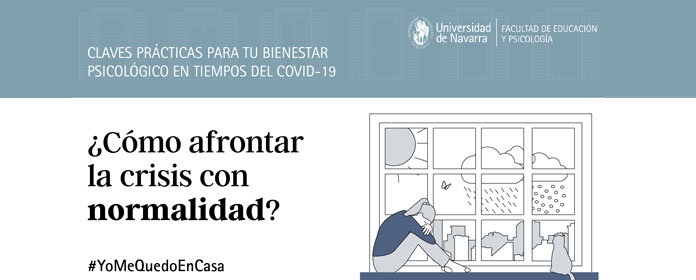Guía para identificar y superar el malestar psicológico generado por el coronavirus
Editada por la Universidad de Navarra, propone técnicas de relajación y control de la ansiedad, ante síntomas como pensamientos negativos, uso excesivo de redes, alteración de sueño, etc.

La incertidumbre, la falta de información, las conductas sociales irracionales desencadenadas por la pandemia del coronavirus pueden favorecer malestar emocional y generar ansiedad. La Facultad de Educación y Psicología de la Universidad de Navarra ha creado una guía que describe algunas claves y ejercicios prácticos para superar el malestar psicológico que puede provocar la situación actual en algunas personas.
El objetivo último es aportar información básica, basada en experiencias reales, y dotar a la población de recursos que puede realizar desde casa. “Pretende arrojar un poco de luz para aquellos que se han sumido en la oscuridad, para los que todavía ven el vaso medio vacío y para los que se resisten a continuar viéndolo medio lleno”, indica el psicólogo y profesor Luis Ángel Díaz.
La guía se presenta como un material práctico para trabajadores y estudiantes, familias y personas que viven solas, así como población de riesgo. Se advierte que, en ningún caso, sustituye la labor de un psicólogo en terapia. Con el título, Cómo afrontar la crisis con normalidad. Claves prácticas para tu bienestar psicológico en tiempos de Covid19, incluye dos partes: por un lado, analiza cómo alcanzar el autoconocimiento paso a paso; y, en un segundo plano, se centra en cómo superar la ansiedad, uno de los síntomas más comunes que ha generado la pandemia.
Principales síntomas y cómo afrontarlosSegún explica el experto, la ansiedad se puede manifestar de diferentes maneras: con una preocupación excesiva; ideas ansiosas (pensamientos negativos sobre el futuro); conductas ansiosas (consultar constantemente las noticias sobre el Covid19, uso excesivo de redes sociales, alteración del sueño…) y sensaciones físicas de angustia (presión en el pecho, alteración del ritmo cardíaco, dificultad para ir al baño, bruxismo).
La guía explica al lector una serie de técnicas de relajación muscular y respiración que ayuden a superar esa situación. “Este tipo de ejercicios, son los más eficaces para recuperar un estado de normalidad en el menor tiempo posible. Al utilizar estas técnicas disminuimos los niveles de tensión, lo que lleva a una sensación de confort, paz y equilibrio mental; reduciendo los niveles de ansiedad”, se indica.
Asimismo, se hace referencia al control de los pensamientos irracionales “surgidos de la preocupación, núcleo de la ansiedad”; y se ofrecen técnicas para revertir este tipo de pensamientos.
Se puede acceder a esta guía, de manera gratuita, a través del siguiente enlace.




